MIND Your Diet for Better Brain Health
Some people follow a specific diet to lose weight, while others follow a diet to lower blood pressure or improve heart health. However, there’s one diet that has the potential to provide all those benefits plus delay or reduce the onset of cognitive decline: The MIND diet.
The MIND diet is a dietary programme specifically designed for Neurodegenerative delay. This was formed by blending 2 highly effective diets: the Mediterranean and Dietary Approaches to Stop Hypertension (DASH) diet.
The Mediterranean diet mainly focuses on a heart-healthy eating plan. The DASH diet aims to treat or prevent high blood pressure. The MIND diet is different because it is designed to target brain health and reduce the risk of some neurological diseases such as dementia. The MIND diet encourages the consumption of a variety of foods that ultimately benefit both the nervous system and cognitive health.
At The Brain & Performance Centre, a DP World Company, our clinical team includes dietetic support for every client due to the important role of nutrition when it comes to cognitive and neurological health.

Essentials for the Brain
For optimal health, your brain needs specific nutrients such as
- Omega-3 fatty acids for strengthening brain cell structure
- Choline to help regulate memory, mood, and cognitive performance
- Flavonoids for regulating inflammation and improving blood flow
- Vitamin E for protection against inflammation
The MIND diet provides all of the above mentioned essential nutrients. The diet omits or limits foods with ingredients that could negatively impact the brain, like saturated fats and trans fats, which are believed to be responsible for increasing beta-amyloid protein levels in the brain. This protein accumulates in the brain and can disrupt communication between brain cells and ultimately lead to brain cell death.
Eating foods that contain these unhealthy fats have been associated with an increased risk of Alzheimer’s disease. Examples of foods containing unhealthy fats are red meats, processed foods, and fried foods.
Foods containing antioxidants and vitamins—like what’s suggested as part of the MIND diet—may prevent the formation of these beta-amyloid plaques in the brain. Plant-based foods also contain phytonutrients and antioxidants which is beneficial for overall health.
More than half of your brain is made up of omega-3 fats. Your body needs foods rich in omega-3 fats to provide the necessary protective anti-inflammatory benefits. Omega-3 foods includes
Healthy fats, known as polyunsaturated fats, found in fish oils, flax seed, walnuts, and cold-water fish for example, and monounsaturated fats, which have anti-inflammatory properties, obtained from eating avocado, nuts, and seeds, all provide the essential omega-3 fatty acids that are beneficial for optimal brain health.

How to Make the MIND Diet Work for You
The MIND diet encourages a diversity of healthy foods designed to deliver a multitude of brain health benefits. It includes foods rich in phytonutrients, vitamins, and antioxidants such as:
- Leafy Greens and Vegetables: eat at least 1 serving of leafy greens e.g. spinach every day.
- Berries: they are particularly emphasized in the MIND Diet due to their potential cognitive benefits. Aim for at least 2-3 servings weekly.
- Nuts: vary the type of nuts you eat to gain the most benefit. One serving of nuts equates to one handful or roughly 30 grams.
- Olive oil and olives
- Whole grain: Oatmeal, quinoa, brown rice, whole-wheat pasta, and 100% whole-wheat bread.
- Fish: Choose fatty fish like salmon, sardines, trout, tuna, and mackerel for their high amounts of omega-3 fatty acids. Aim to have oily fish once weekly and white fish once weekly.
- Beans, lentils and soybeans.
- Poultry: chicken, turkey.
- Stay hydrated.
Other tips include cooking at home to have better control over the ingredients and cooking methods. Also, be mindful of your portion sizes and create a meal plan to make it easier to adhere to the diet.
Foods to Limit or Avoid
- Butter and margarine: limit your intake to less than one tablespoon daily.
- Cheese: if you have cheese, the best options are the white cheeses such as feta/Greek cheese, halloumi, cottage cheese.
- Red meat: aim for no more than two servings each week.
- Fried food: the MIND diet highly discourages fried food, especially from fast-food restaurants. Limit consumption to a maximum of once weekly.
- Pastries and sweets: limit your intake to a couple of times a week.

The Bottom Line
Researchers are learning more and more about the link between cognition and the MIND diet. Please keep in mind, the MIND Diet is not a guarantee against cognitive decline or neurodegenerative diseases, but it may help reduce your risk and promote overall health. As you age and the risk of developing memory disorders like dementia increase, laying a firm foundation for healthier eating will become vital to maintaining quality of life.
As leaders in brain performance, the expert clinicians at The Brain & Performance Centre help keep your mind and body healthy for years to come. With hyperbaric oxygen therapy (HBOT) at its core, cognitive and physical training, and nutrition coaching, the ground-breaking The Brain & Performance Centre enhances cognitive and physical function and triggers the body’s natural capabilities at self-regeneration.
Contact us for a free consultation and learn about how our nutritional coaching will enhance the benefits of The Brain & Performance Centre.
5 Ways to Maintain Healthy Cognitive Ability as You Age
You want to stay sharp as you get older, we get it. Everyone hopes to age gracefully and enjoy their golden years full of new experiences and good memories. But as you know, this doesn’t always happen. Some people, as they grow in years, lose mental clarity and ability. Often this happens so gradually that it’s like watching hair grow—a loss of cognitive ability isn’t even noticed until it’s too late to do much about it.
But don’t worry, there is plenty of good news.
There are scientific, practical ways to help you maintain optimal brain health as you get older. As a health and industry leader in cognitive and physical performance, The Brain & Performance Centre provides valuable, research-backed information to help you control your cognitive ability long into your twilight years.
5 Categories of Cognitive Skills You Want to Maintain
When we talk about cognitive ability, what we’re referring to is a set of seven skills that work together to help you in your daily life:
- Short-term memory
- Long-term memory
- Attention—sustained, selective, and divided
- Processing speed, including visual and auditory
- Logic and reasoning
Our brains can do brilliant and beautiful things! We simply need to nurture their natural abilities, so we can slow (or prevent) mental decline.
How to Improve Cognition – Follow Your Doctor’s Orders
Knowing how to improve cognitive skills is the first step toward achieving your goal of staying sharp and full of life for many years to come.
First, are you at risk of cognitive decline as you age?
- Do you have depression?
- Are you lacking sufficient mental activity?
- Are you avoiding physical exercise?
- Would your doctor consider you obese?
- Do you have high blood pressure?
- Have you been diagnosed with Type 2 diabetes?
- Are you a smoker?
To significantly lower your risk of cognitive decline, follow your doctor’s orders and incorporate these five must-have lifestyle adjustments to enhance your cognitive ability.

1. Sink Your Teeth into a Delicious Mediterranean Diet
Good nutrition goes a long way in maintaining a healthy brain and body. Studies show an association between high adherence to a Mediterranean diet and reduced risk of Alzheimer’s disease.
A Mediterranean diet entails:
Eating plenty of:
- Fruits and vegetables
- Fish and seafood
- Nuts and legumes
- Whole grains
- Unsaturated oils (extra-virgin olive oil and avocado oil)
Eating in moderation:
- Poultry
- Eggs
- Cheese
- Yogurt
Eating rarely:
- Red meat
- Refined grains
- Added sugar
- Highly processed foods
Read MIND Your Diet for Better Brain Health for some very interesting and informative guidance from a dietician, Kathryn Parker, RD, LD/N.

2. Increase Brain Metabolism through the Heart, Muscles, and Mind
Research links moderate exercise to increased brain metabolism and improved overall cognition. Exercise need not be too strenuous, but getting the heart rate up, building muscle, and pumping oxygen through your lungs and blood is very beneficial to your mental health. Physical activity can also improve heart conditions (one of the sources of cognitive decline).
Great examples of moderate physical activity include:
- Jogging or brisk walking, especially up an incline or in the sand
- Stretching morning and night
- Gardening and other household tasks
- Cycling either on a stationary bike or along a path
- Tai chi and yoga
- Playing outside with your children or grandchildren
If you’re an athlete who wants to up your game, The Brain & Performance Centre will help you achieve your physical goals. Watch the stories of success.

3. Don’t Let Stress Induce Deleterious Effects
If not managed, chronic stress often impairs memory retrieval and information acquisition, even inducing deleterious effects on brain structure and cognition. To help you bounce back from a stressful situation, consider:
- Engaging in physical activity
- Writing your thoughts in a journal
- Getting more sleep—it’s in the downtime that the brain flushes toxins out and cleans itself, allowing the repair you need from spikes of stress
- Doing relaxation techniques such as meditation or breathing exercises
4. Actively Build Neural Pathways
Identify hobbies or activities that keep your mind engaged. For example, one study discovered older adults who took up new body-connected activities that worked the brain in new ways experienced more memory improvement than those who did not.
Here are a few ideas when wondering how to improve your cognitive skills:
- Learn a new language and travel to where you can use it.
- Begin quilting or other detail-oriented crafts.
- Study photography, take pictures, edit them, and share.
- Try reflective therapy, like journaling, to revisit past negative memories and rewrite them more positively (“what I’ve learned” or “how it made me grow”).
- Invest (especially mentally and physically) into your child’s or grandchild’s hobby. Do they play lacrosse? Learn the rules of play and volunteer for the team. Do they have a knack for mathematics? Be their study buddy.
5. Stay in Touch with Your Trusted Physician
It’s essential to discuss cognitive decline with a trusted physician. The more you understand how your health can affect your brain function, the more you can do to safeguard your cognitive vitality. Discuss your options and advocate for yourself to get next-level care that will keep you healthier for the long term.
Fight Cognitive Decline with The Brain & Performance Centre

Maintaining your overall health is beneficial for the longevity of your life. Fight cognitive decline with The Brain & Performance Centre. Every person’s body and health are unique, and your medical treatment programme should reflect that.
The Brain & Performance Centre is the leader in brain performance—our programme will keep your brain at its best. Our diverse team of medical professionals will provide the customized attention you need to maintain optimal cognitive health and reverse cognitive decline.
Contact us to learn how we can help.
New Study Shows HBOT Can Reverse the Main Activators of Alzheimer’s Disease and Help Prevent Memory Loss
A groundbreaking new study has brought scientists one step closer to preventing and curing age-related cognitive decline, especially related to early stages of Alzheimer’s disease and dementia.
This landmark study, published in Aging on September 9th, is part of an ongoing programme researching age-related cognitive decline. Conducted by the Sagol School of Neuroscience in Tel Aviv and Tel Aviv University, the study marks the first time that hyperbaric oxygen therapy (HBOT)—a non-pharmaceutical method—has proven effective in reversing the main activators and early symptoms of Alzheimer’s disease.
HBOT is a form of oxygen therapy that involves administering 100% pure oxygen to a patient in a pressurized environment. HBOT has been used for decades to treat other conditions, such as non-healing ischemic wounds, but for the first time, it also has shown promise as a potential treatment for reverse the main activators and early symptoms of Alzheimer’s disease and dementia and treat brain and cognitive problems.
A treatment based on this unique protocol is now available at The Brain & Performance Centre.
Aging and reduced blood flow
The brain is an incredibly complex organism home to a vast network of nerve cells (neurons) that depend on oxygen to thrive. As we age, the number of blood vessels in our brain naturally begins to decline. This causes reduced blood flow to the brain, which in turn causes the brain to receive less oxygen. This decreased blood flow is also known as vascular dysfunction, and it’s a known precursor to Alzheimer’s disease, along with amyloid plaques.
What is an amyloid plaque?
Amyloid plaques are hard, insoluble clusters of proteins formed in the spaces between neurons. They’re formed from beta amyloids—microscopic protein fragments produced by certain cells in the body. In the brain, beta amyloids are found in the fluid between neurons, and a healthy brain usually flushes them out without consequence. However, just like plaque can accumulate on your teeth if you don’t clean them regularly, the same thing can happen in your brain.
As the brain ages, it’s more susceptible to forming amyloid plaques in its blood vessel walls. Once an amyloid plaque forms it can damage the neurons in the brain, ultimately resulting in neuronal death. These plaques are thought to contribute to the progression of Alzheimer’s disease and the cognitive decline associated with it.
For years, scientists have wondered whether or not it’s even possible to dissolve or shrink amyloid plaques. The groundbreaking new study proves for the first time that a unique protocol of HBOT can both reverse amyloid plaques and prevent them from forming in the first place.
How HBOT can reverse amyloid plaques
Study researchers initially used HBOT with mice to understand the effect it has on amyloid plaques. In this first part of the study, researchers delivered HBOT to a group of mice whose brains contained amyloid plaques. The mice received two 60 minute HBOT sessions a day, five days a week for four weeks. The researchers discovered that HBOT significantly reduced the amyloid burden in the mice’s brains, decreasing amyloid plaques by over 30% and shrinking plaques by nearly 19%.
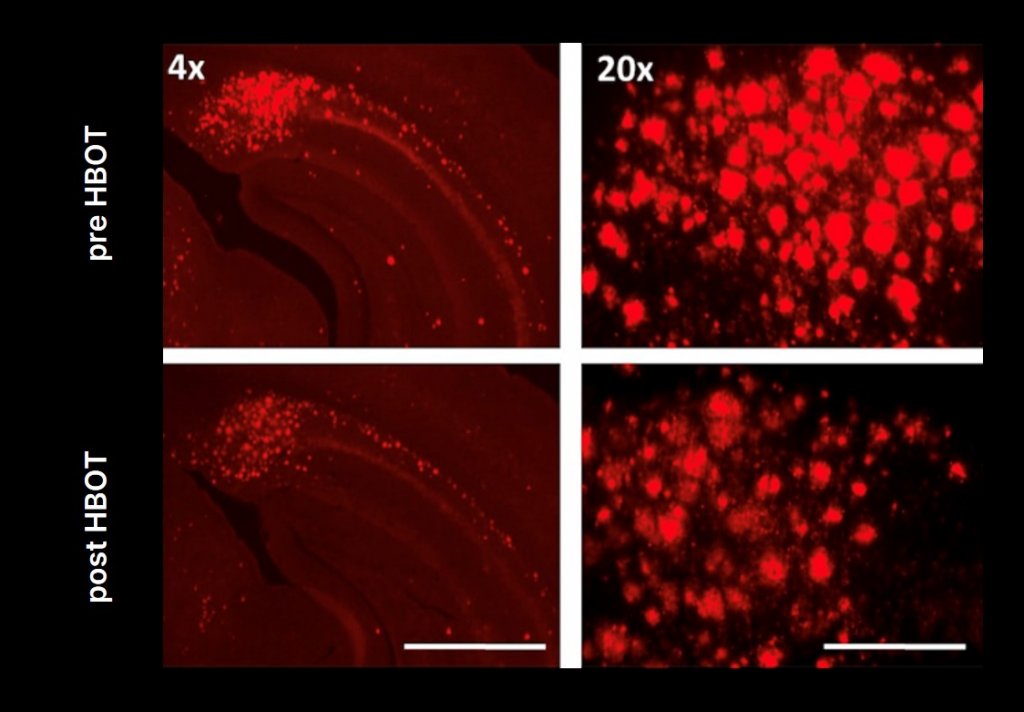
HBOT was also shown to prevent the formation of new amyloid plaques, and the mice exhibited improved performance on cognitive tasks when compared to the control group, giving us evidence that HBOT improved their cognitive functions.
The mice-based study gave promising new evidence that HBOT can be used as both a treatment and a preventative measure for Alzheimer’s disease. Researchers then sought to use the same protocol with human subjects.
The human test group consisted of six patients around age 70, all suffering from mild cognitive impairment. After receiving 60 daily HBOT sessions over a three-month period, the patients saw significant improvements to their cognitive functions, including better memory recall, concentration, and response times.
The researchers theorize that this is due to HBOT’s ability to increase blood flow in the brain. When the brain receives more blood, it receives more oxygen. And when the brain receives more oxygen, it can function at its full capacity.
What this means going forward
The study gives us hope that HBOT can be used as a viable drug-free and non-invasive method to prevent and treat Alzheimer’s disease, bringing us one step closer to preventing and even repairing memory loss and mild cognitive impairment.
“By treating vascular dysfunction, we’re mapping out the path toward Alzheimer’s prevention. More research is underway to further demonstrate how HBOT can improve cognitive function and become an influential tool in the imperative fight against the disease,” affirms Dr. Shai Efrati, one of the researcher conducting the study.
For more information about The Brain & Performance Centre’s unique HBOT treatment, and how it may help your brain health, please contact us.
To read the study published in Journal Aging – click here.
Exploring the Powerful Benefits of Nuts for Your Cognitive and Overall Health
For a nutrient-dense snack that contributes to weight management, while also providing advantages for heart and brain health, consider incorporating a daily portion of assorted nuts into your eating routine.
Nuts and seeds are a nutritional powerhouse, boasting low carbohydrate content and an abundance of fiber, protein, antioxidants, crucial vitamins and minerals, as well as an assortment of beneficial phytochemicals. Research suggests that including nuts and seeds in your diet could potentially diminish the likelihood of various conditions such as elevated blood pressure, heightened cholesterol levels, and inflammation, which are linked to the development of ailments like heart disease, diabetes, cancer, and stroke.
Nutritional profile of mixed nuts
While nuts and seeds are packed with essential nutrients that can enhance a balanced diet, it’s advisable to consume them in moderation due to their elevated fat and calorie content. It’s important to note that the fats found in nuts and seeds are primarily of the unsaturated variety, including beneficial omega-3 fatty acids that promote heart health. Nonetheless, like any indulgence, overconsumption can undermine your efforts to opt for healthier, low-fat, and low-calorie snack choices.
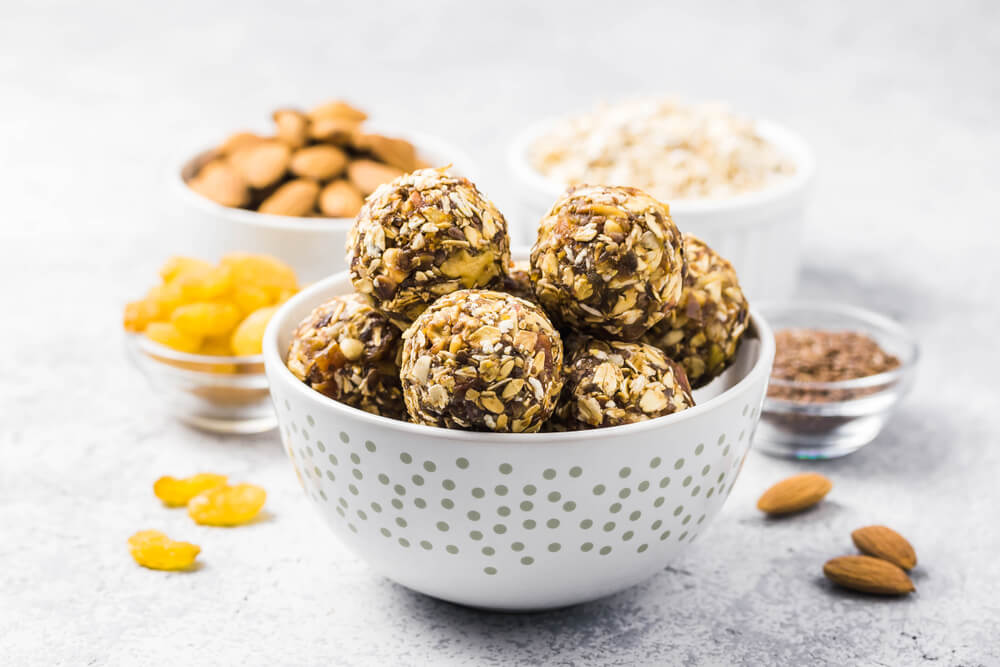
What makes nuts and seeds so beneficial?
Nuts and seeds are considered superfoods, offering a multitude of health benefits even in small quantities.
Here are some advantages:
- Positive impact on Lipid Profile: consuming nuts in moderation is unlikely to adversely affect your lipid panel. In fact, research suggests that they may contribute to reduced bad cholesterol levels.
- Source of Phytosterols: Nuts and seeds also include sources of phytosterols, a substance that holds potential in cholesterol reduction. These naturally occurring sterols contribute to the health benefits of these foods.
- Rich Source of Omega-3 Fatty Acids: While commonly associated with fish, omega-3 fatty acids are also prevalent in nuts. These essential nutrients play a role in maintaining the structural integrity of cell walls throughout the body. Maintaining a balanced intake of omega-3 fatty acids is also crucial for preventing potential imbalance linked to neurodevelopmental disorders.
- Rich in Dietary Fiber: Nuts and seeds offer a significant source of dietary fiber, which plays a key role in regulating the immune system, combating inflammation, and promoting regular bowel function. This fiber content is particularly beneficial for maintaining gut health. For individuals aged 50 and above, the Institute of Medicine recommends a daily intake of 25 grams for women and 30 grams for men. A mere handful of nuts supplies nearly four grams of fiber. A diet high in fiber can also support the growth of beneficial gut microbes, which play a role in producing short chain fatty acids, which is important for gut health and can potentially influence brain health through various pathways.
- Rich in Vitamin E and L-arginine: Vitamin E, present in substantial amounts in nuts and seeds, contributes to the prevention of arterial plaque formation. This plaque buildup, if unchecked, can lead to conditions like heart disease, angina, and cardiac arrest. Additionally, L-arginine, a component found in these foods, aids in enhancing blood flow by increasing the flexibility of artery walls and reducing the likelihood of blockages.
- Good source of protein: Nuts and seeds encompass varying levels of protein content, making it beneficial to consume a diverse range. Protein is essential for cellular repair and regeneration. For optimal intake, protein should constitute approximately 10 to 35% of your daily calorie consumption. This equates to around a minimum of 50 grams of protein per day for adults.
- Antioxidant Powerhouses: Within nuts and seeds lie a rich reserve of antioxidant vitamins and phenolic compounds. These compounds play a role in reducing inflammation and alleviating oxidative stress. Oxidative stress triggers an internal imbalance, allowing an excess of free radicals within the body’s cells. Research shows that by neutralizing these free radicals, nuts and seeds have demonstrated the ability to effectively mitigate oxidative stress, thereby promoting overall health and reducing the undesirable effects of aging.
- Other possible benefits to include:
- Support the production of neurotransmitters, such as dopamine and serotonin, which regulate mood and behavior. Thus, reducing the risk of depression and anxiety.
- Boost energy levels and combat fatigue, which can positively impact cognitive performance.
- Nuts have a low glycaemic index and can help regulate blood sugar levels. Stable blood sugar levels are important for brain health and reducing the risk of cognitive decline.
While nuts can be a beneficial component of a brain-healthy diet, it’s important to adopt a comprehensive approach to brain health that includes a well-balanced diet rich in a variety of nutrient-dense foods, regular physical activity, adequate sleep, stress management, and cognitive engagement.
How often should nuts and seeds be eaten?
As mentioned above, nuts and seeds are calorie-dense, so portion control is key. A standard serving size is about 1 ounce (28 grams) per day, which is roughly a small handful. This provides nutritional benefits without excessive calories. Substitute between different types of nuts and seeds to ensure you are getting a broad spectrum of nutrients.
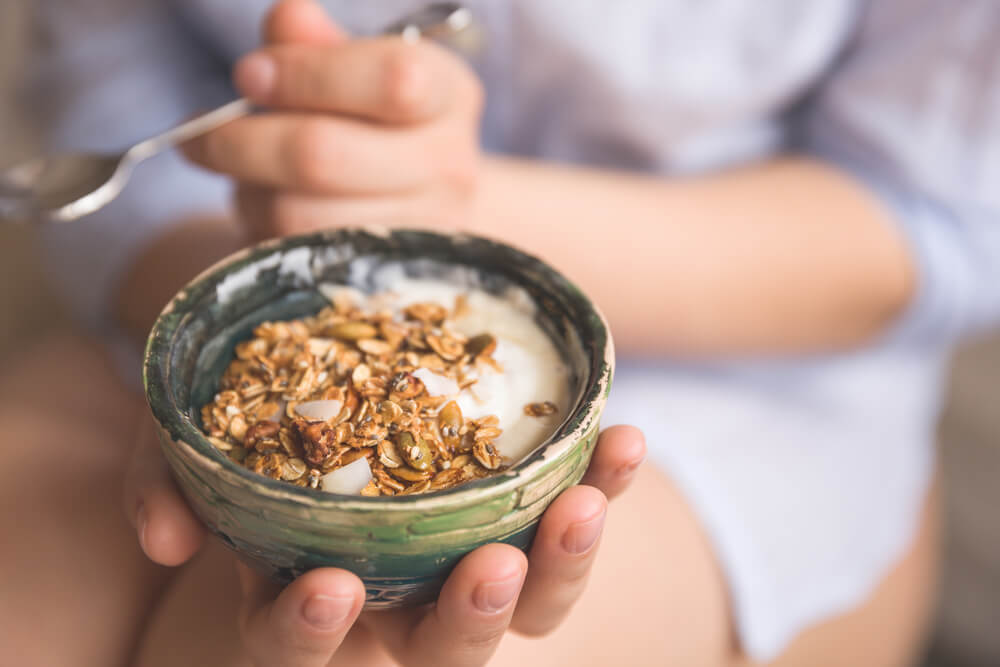
How to incorporate them into your diet
- Add pumpkin seeds to salads, oatmeal, rice, sweet potatoes, and quinoa for added flavor, fiber, and texture.
- Incorporate nuts and seeds—such as pine nuts, sunflower seeds, chia seeds, and pumpkin seeds—into smoothies. These choices are excellent sources of protein, fiber, and omega-3 nutrients.
- Create your own trail mix by blending nuts and seeds, and then adding the mix to yogurt or enjoying a handful as a snack.
- Nutty Pesto: Blend nuts like pine nuts or walnuts into homemade pesto to serve over pasta, grilled vegetables, or as a dip.
- Stir-Fries: Sprinkle seeds (e.g., sesame or pumpkin seeds) over stir-fried dishes to add a nutty crunch.
- Baked Chicken or Fish: Use crushed nuts or seeds as a coating for baked chicken or fish, adding a flavorful and nutritious crust.
- Fruit Parfaits: Layer yogurt, fruits, and a sprinkle of chopped nuts or seeds to create a nutritious and indulgent dessert.
- Nutty Bites: Create small energy bites by combining nuts, seeds, dried fruits, dates, and honey. Roll them into bite-sized balls for a sweet treat.
- Frozen Yogurt Bark: Mix chopped nuts and seeds into Greek yogurt, spread it onto a baking sheet, and freeze for a delicious frozen dessert.
In the pursuit of optimal brain health, nutrition plays a crucial role.
Nutrition stands as a core component within The Brain & Performance Centre, a DP World Company. Building the right nutrition plan involves a comprehensive analysis, taking into account your dietary intake, habitual behaviors, personal preferences, existing health conditions, and aspirations. The outcome is a personalized roadmap intended to provide your brain and body with the precise combination of nutrients and energy necessary for the rejuvenation process.
Our approach is built upon a comprehensive assessment of your dietary intake, habits, preferences, health conditions, and individual objectives. Throughout the Programme, your dedicated dietitian closely monitors your nutritional consumption to ensure that you are deriving the maximum benefits as you make progress.
If you’re interested in understanding how our programme operates and its advantages, Contact the clinic to learn more.
How Does Sugar Affect the Brain?
From the Paleo diet to the Mediterranean diet to the ketogenic diet and beyond, there’s one thing that nearly all modern diets agree on—if you want to maintain a healthy body and mind, cut out sugar.
While there’s wisdom in this advice, blanket statements like “cut out sugar” can leave room for confusion. It leaves many people wondering, is all sugar bad for you? Should you avoid sugar in any form, including in fruits? What about carbohydrates found in vegetables like potatoes? With so many complicated questions like these and no clear answers, it’s no wonder many people feel confused. As a centre dedicated to improving brain health and performance, The Brain & Performance Centre understands the importance of proper nutrition and its direct effect on cognitive and physical functioning.
Let’s examine sugar in detail and clarify what dietitians really mean when they tell you to cut out sugar.
Is Sugar Really the Enemy?
Not exactly—foods with high amounts of sugar can still be healthy! For example:
- Apples contain lots of sugar but water, vitamins, nutrients, and dietary fibers that are vital for a healthy body. Dietary fiber is essential for maintaining a thriving wealth of gut flora. Gut flora builds our immune system and fights off ailments like leaky gut disease.
- You can find natural sugars in many whole foods. They also come in many different chemical forms, including glucose from carbohydrates. Glucose provides our bodies with energy, helping fuel our muscles and vital organs as it circulates throughout the bloodstream. We wouldn’t be able to function normally without the glucose from carbohydrates.
Does Your Brain Need Sugar?
Although the brain can use alternative fuel sources for fuel if you’re insulin resistant, such as ketones, glucose is the brain’s preferred fuel source. The brain relies heavily on glucose when performing complex tasks requiring much thought.
So when you’re concentrating extra hard on a crossword puzzle or a complicated passage in your favorite book, your brain is burning glucose over time to help you get the job done. If your blood sugar dips too low, you can experience problems like brain fog or trouble concentrating. It’s your brain’s way of telling you that it needs more fuel and that you should grab a healthy snack.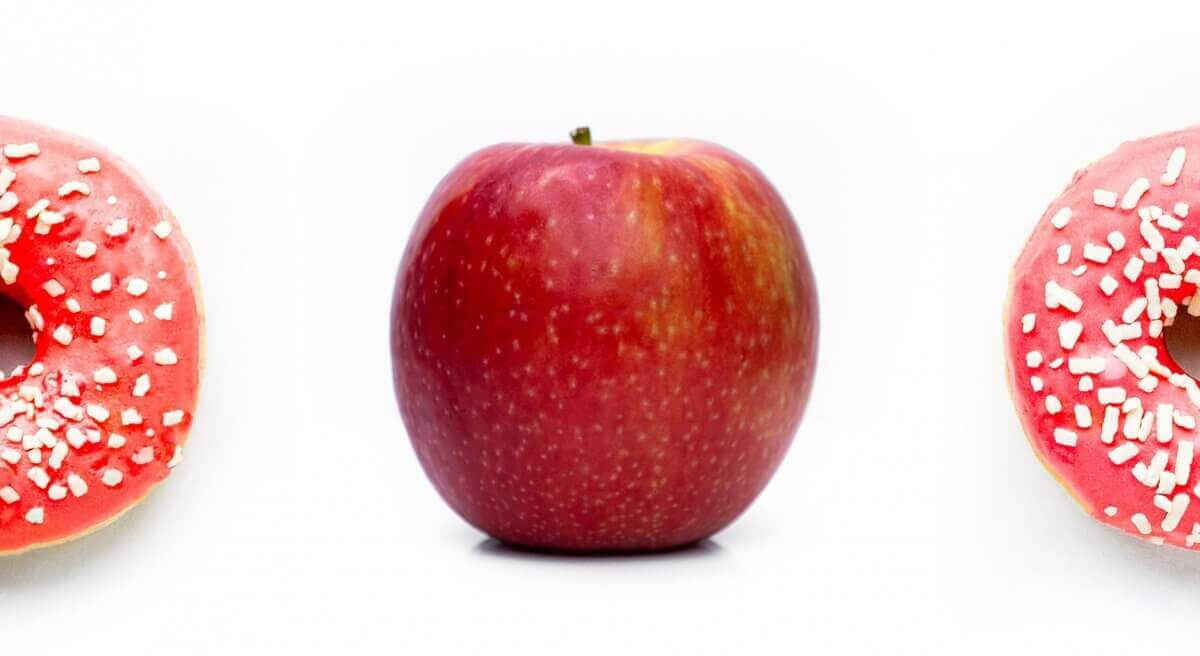
What Is the Difference between Natural Sugar and Refined Sugar?
While natural sugar naturally occurs in foods, refined sugar is processed to extract the sugar.
Natural Sugar Process
When you eat an apple, your body does all the work of processing the unrefined fruit into digestible nutrients all on its own.
First, you must chew the apple, breaking it down into apple sauce. Then, your gut does the hard work of absorbing the vital nutrients and breaking down the sugar to send circulating throughout your bloodstream.
The leftover fiber is used to nourish your gut’s network of microflora. When you eat whole foods, your body is the factory, and the natural sugars in your foods are the fuel that runs it.
Refined Sugar Process
Foods with refined sugar are a different story. Candies, cookies, chips, and other pre-packaged snacks don’t offer your body the same fuel as whole foods. Your body doesn’t have to go through the work of breaking down these highly processed foods—the factory already did it for you.
Processed foods are loaded with refined sugar without any of the nutrients, vitamins, and fibers your body needs. This leaves your gut flora starved of the materials required to function and your immune system vulnerable.
Is Sugar Bad for Your Brain?
It’s possible to have too much of a good thing. Modern western diets are filled with refined sugar and carbohydrates in the form of ready-made snacks, treats, and processed foods.
Thus, you may feel sluggish once the “sugar high” wears off. Eating too much sugar can also make you susceptible to health conditions like type 2 diabetes.
The best way to limit refined sugar intake is to lean on a natural diet consisting of whole foods.
What Does Sugar Do to Your Brain?
Excessive sugar intake can impact specific neurotransmitters and bring on memory deficiencies. Among these neurotransmitters is dopamine—the chemical controlling mood, behavior, learning, and memory.
Here’s what research studies further illustrate:
- When rats were fed a high-sugar diet that resembles the average western diet, their cognitive performance suffered. The rats struggled to complete tasks that relied on their memory. Their struggles suggest their diets were directly responsible for impairing their brain’s prefrontal lobe and hippocampus regions.
- Eating a diet high in sugar can reduce the production of a chemical called “brain-derived neurotrophic factor” (BDNF). This chemical is active in areas of the brain vital to learning, memory, and higher thinking. Low BDNF levels are associated with poor memory function and are linked with Alzheimer’s Disease and dementia.
- Experiments in animals and people have revealed that when the brain needs an extra power boost, blood vessels in the brain dilate to deliver more glucose and oxygen through the bloodstream.
Is Sugar Important to the Body?
Yes, natural sugars in the foods you eat perform a vital role in energizing the body and mind. The body requires a total of 200 grams of sugar or glucose each day. Two-thirds of this, or 130 grams, is used by the brain to help you function to your best ability.
The key takeaway from the information we presented above is this—incorporating a diet filled with natural, whole foods is essential to:
- Nourishing your body with the right type of sugar
- Enhancing cognitive and physical performance
4 Tips for Healthy Eating
The natural sugars found in whole foods are nothing to fear. Eating a diet with enough carbohydrates and natural sugars is vital for keeping your body and brain healthy.
Here are a few ways to stay on track:
- Make sure the bulk of the sugar you consume comes from whole foods like fruits and vegetables, not processed junk foods.
- Just because a food is labeled “sugar-free,” that’s not always the case. It may be true that a food doesn’t contain added sugar, but remember that carbohydrates turn to glucose in your body.
- You can rack up carbohydrates quickly on a typical day. Try to aim for around 45 total carbs at every meal if you’re a woman or 60 every meal if you’re a man. You’ll be surprised how quickly you can meet that quota with just a handful of whole foods!
- You don’t have to cut out refined sugar altogether. Obsessing over eating a “perfect” diet only stresses you out and doesn’t leave any room for you to feed your soul. Do you plan on spending a relaxing afternoon baking with your grandkids? Go ahead and treat yourself to a warm cookie fresh from the oven.
If you’re eating healthy at most meals, there’s no need to feel guilty about indulging in rich foods now and then. Just be smart about it, and always make conscious decisions about what kind of foods you put into your body.
The Brain & Performance Centre delivers a highly effective, science-based treatment protocol to enhance brain performance and improve the cognitive and physical symptoms of conditions such as age related decline, post stroke, long Covid, traumatic brain injuries and fibromyalgia. The Brain & Performance Centre ’s intensive treatment protocol uses Hyperbaric Oxygen Therapy and includes nutrition management and dietitian support to optimize your diet for better brain health. Based on over a decade of research and development, The Brain & Performance Centre is holistic and customized to your needs.
Contact us to learn more.
The Effect of Intermittent Fasting on Your Brain
There’s a lot of debate in the health and wellness sphere about the best diet for your health. Where some swear by low-carb high-fat diets, others insist that high-carb low-fat is the only way to eat. With so many conflicting opinions, it’s difficult to know whom to trust or what to listen to. Fortunately, there is a way you can eat that may help you lose weight, improve your brain health, and even increase your longevity, all without strict dietary restrictions. Best of all, it’s not a “diet” at all!
This “non-diet” is intermittent fasting, which is quickly building up steam in the dietary community. Unlike fad diets, fasting is more than just a passing trend because it’s as old as humanity itself. Our bodies are designed to fast, and you already do it every day. From the time you eat your last meal at night, to the time you eat breakfast in the morning, you’re fasting. Intermittent fasting is about gradually pushing out this window until your brain and body start reaping the benefits.
As a centre dedicated to improving brain health and performance, The Brain & Performance Centre understands the importance of proper nutrition and its direct effect on cognitive and physical functioning. Making dietary changes, such as Intermittent fasting, benefits brain health, promotes weight loss, and prevents certain diseases. Here’s more on intermittent fasting, along with how you can start fasting yourself.
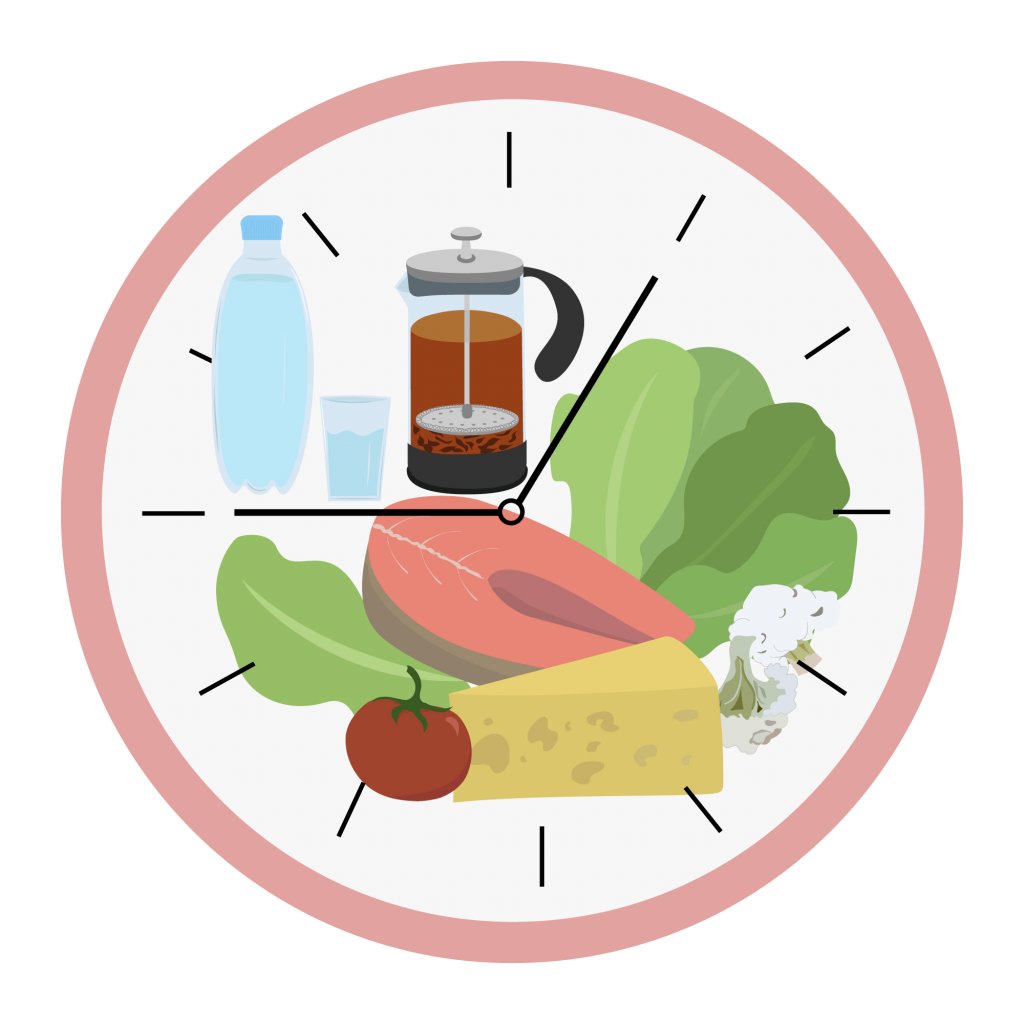
What is Intermittent Fasting?
Intermittent fasting is an eating style that involves alternating between periods of eating and fasting.
Intermittent fasting is not a diet; it’s a lifestyle. You’re in charge of your own meal plan, and you can customize it to your liking. You can combine intermittent fasting with the Mediterranean diet, Paleo, Keto, DASH, or any other diets. If you don’t want to follow a particular diet, just make sure that you make healthy food choices. Try to avoid artificial ingredients or overly processed foods. So long as you meet all your nutritional requirements within your eating window, just about anything goes!
Because you’re not tied down by the restrictions of a traditional diet, you have the freedom to customize your meals to your own preferences. This means that you’re more likely to stick to a consistent diet plan, which is essential if you want to lose weight and keep it off.
Is intermittent fasting healthy?
Although conventional advice would have us believe that we need to eat every 2-3 hours to sustain ourselves, our evolutionary history paints a different picture. Our hunting and gathering ancestors didn’t have regular access to food like we do, so their bodies had to develop a way to operate without a consistent source of glucose. That’s where fasting comes in as a survival mechanism.
In the same way that you might clean your home and throw out the things you don’t need, fasting is our body’s way of cleaning up shop. Fasting for extended periods allows your body to cleanse itself and use up leftover nutrients from the previous day’s meals, which triggers a process called “metabolic switching”.
Metabolic switching slows the aging and disease processes and promotes weight loss in obese individuals. Fasting also prevents breast cancer in both women and men, and studies suggest that it may improve longevity. Eating constantly doesn’t allow the body time to properly rest, which means you won’t experience the cleansing benefits of metabolic switching.
What fasting does to the brain?
Intermittent fasting is amazing for maintaining brain health. In addition to slowing the aging process, metabolic switching increases neuroplasticity in the brain. This helps optimize brain function and increase the brain’s resistance to injury and disease. Intermittent fasting also triggers a process called autophagy, which works to ward off Alzheimer’s disease and Parkinson’s.
Fasting can also clear brain fog and sharpen the mind. Many people who fast report clearer thinking and improved moods, which can benefit your brain-gut connection and increase your overall happiness.
Intermittent Fasting for Beginners
There are a few different ways to practice intermittent fasting.
Some of the most common methods include:
Time-restricted fasting
This is the most common method of fasting, and the one most people will end up practicing. It works by limiting the daily window where you eat your food every day. For example, if you eat your first meal of the day at 10 am and your last meal at 6 pm, then you’ve fasted for 16 hours and eaten for 8, meaning that you followed a 16:8 fasting schedule. Common ratios for time-restricted fasting include 14:10, 16:8, 18:6 and 20:4.
5:2 Fasting
This method of fasting involves eating normally for 5 days a week and fasting for two. On fast days, you’ll eat one 500 calorie meal if you’re a woman, or one 600 calorie meal if you’re a man.
Alternate Day Fasting
This is a more extreme version of 5:2 fasting. Instead of fasting for only two days a week, you’ll fast on alternating days, following the same 500-600 plan for meals on fast days.
Start with time-restricted fasting before trying the more advanced options. Just like you can’t expect to run a marathon without experience, you can’t expect to fast for hours on end without a little training first.
Try gradually shrinking your eating window every day until you’ve reached your goal. If you currently eat your first meal at 8:00 am, try pushing it out to 9:00 am and eventually to 10:00 am or 11:00 am. Or if you want to try 5:2 fasting, start out by fasting only one day a week and gradually upping it to two. Whatever fasting schedule you choose, just try to be consistent. Establishing a routine and sticking to it helps establish consistency, which is key for a healthy lifestyle.
What constitutes breaking a fast?
If you’re interested in giving fasting a try, you might be wondering about what counts as breaking a fast.
Will your morning cup of coffee ruin your fasting schedule or not? The answer is, it depends.
While calorie-free beverages like coffee or tea are all right to drink while fasting, anything that has calories in it breaks a fast. That includes any kind of artificial sweeteners or creamers you may add to your favorite drink.
That doesn’t mean that you have to drink black coffee exclusively, however. You can make a game out of adding creamer to your coffee at a later time every day. Try challenging your family members or friends to see who can hold out with black coffee the longest!
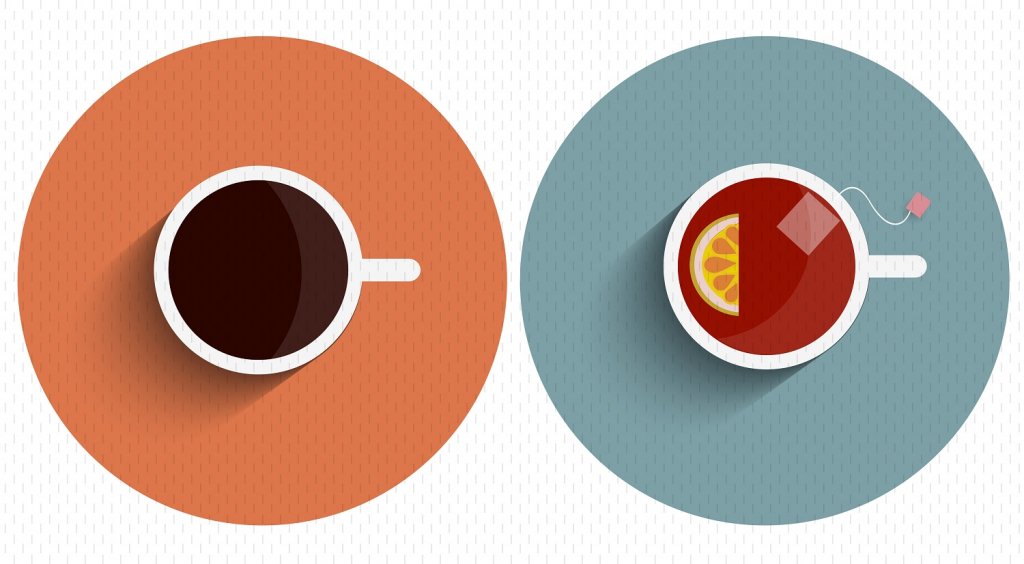
Is there anyone who shouldn’t fast?
People with Type 1 diabetes or anyone who takes insulin shouldn’t fast. This can put you at risk for dangerous blood sugar problems like hypoglycemia or ketoacidosis. People with hypertension, blood pressure problems, or cognitive impairments shouldn’t fast either, and neither should anyone who struggles with remembering to eat on a daily basis.
Certain medications may also prevent people from fasting, and those who use canes or wheelchairs should also take care not to fast. As with any diet, check with your healthcare provider if you’re not sure that fasting is right for you.
Conclusion
The benefits of intermittent fasting are numerous and clear. It can increase your lifespan, lower your risks for diseases and improve your brain’s overall health. But perhaps fasting’s biggest benefit is that it allows you to put the joy back in eating. When you don’t have to worry about weighing, counting or measuring, you can focus on eating foods that nourish not only your body, but also your soul.
You can still indulge in your family’s traditional recipes without feeling guilty. It’s important to eat a balance of foods that make you happy and foods that keep you healthy. Intermittent fasting provides you with the perfect framework for this, allowing you to live your best life possible exactly the way you want to.
The Brain & Performance Centre, a DP World Company
Nutrition is an important pillar in your approach to health, especially as you age. The Brain & Performance Programme utilizes a multidisciplinary approach to healthy aging, including a personalized nutrition plan based on a comprehensive assessment to address your individual needs and goals, along with hyperbaric oxygen therapy, physical training, and cognitive training.
Discover how you can take your brain health and longevity into your own hands with The Brain & Performance Centre. Learn more today.
